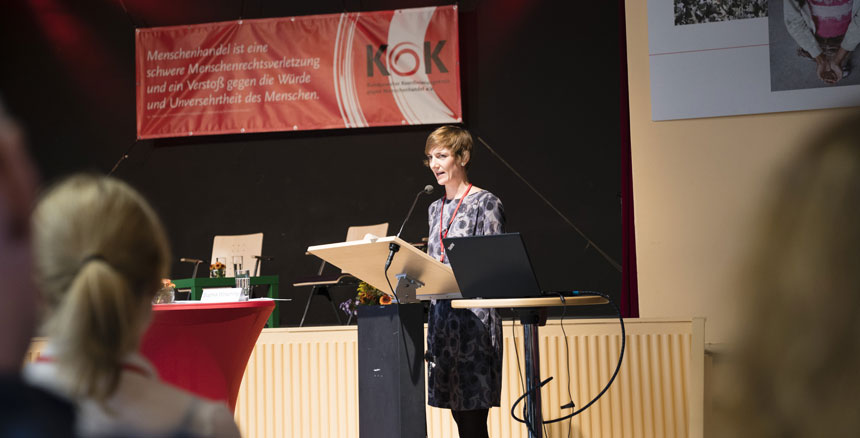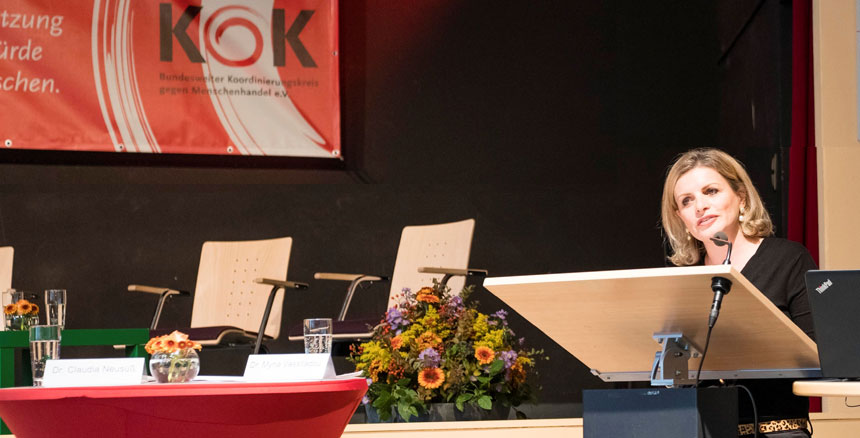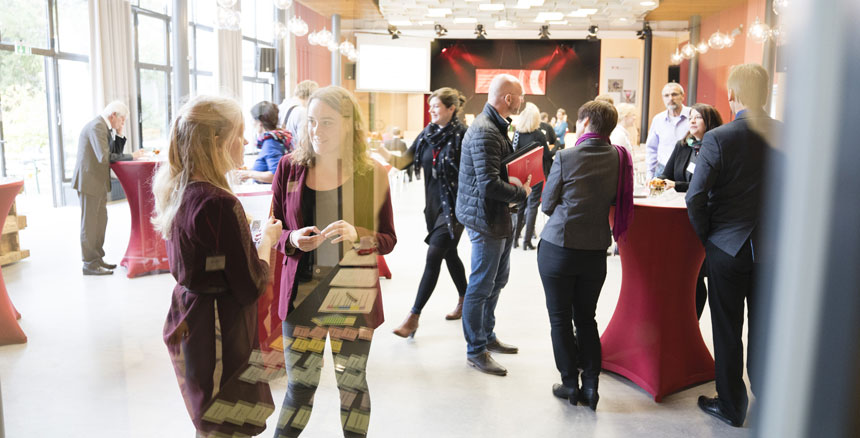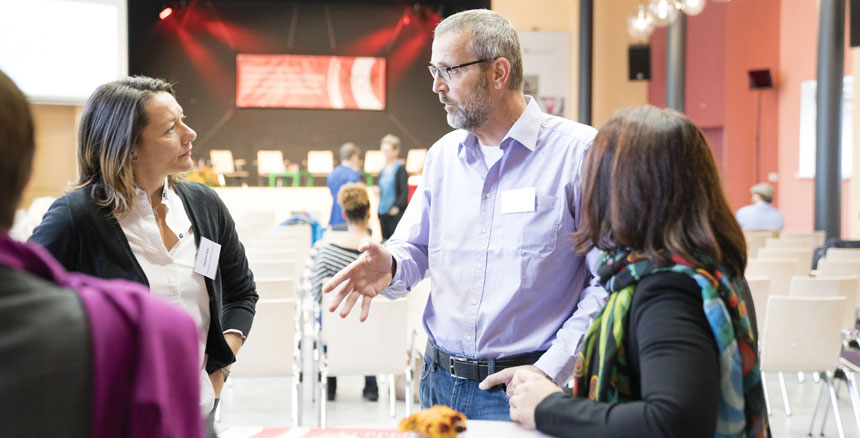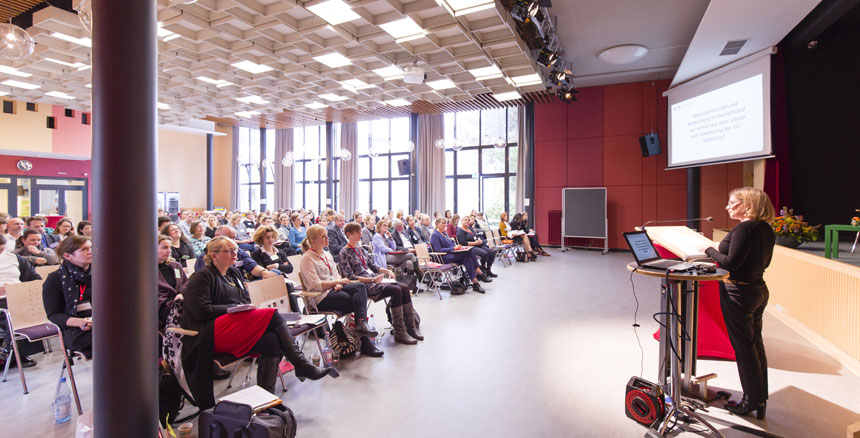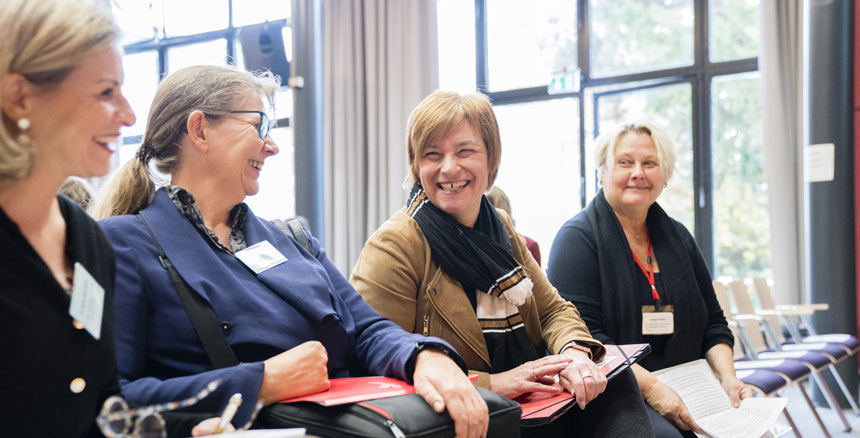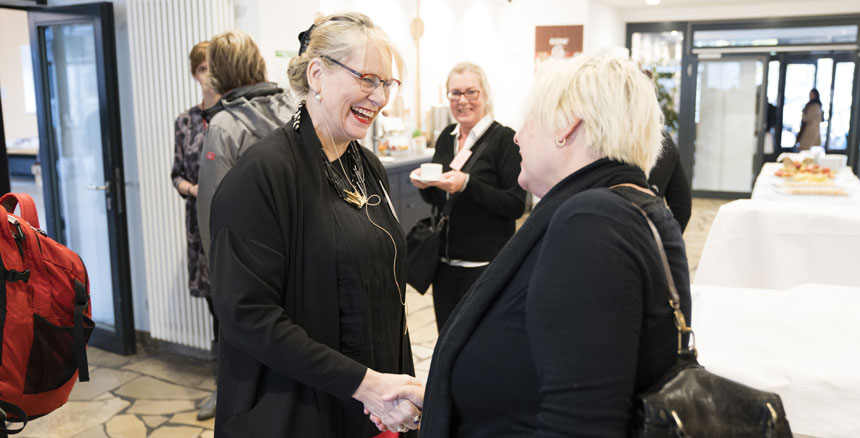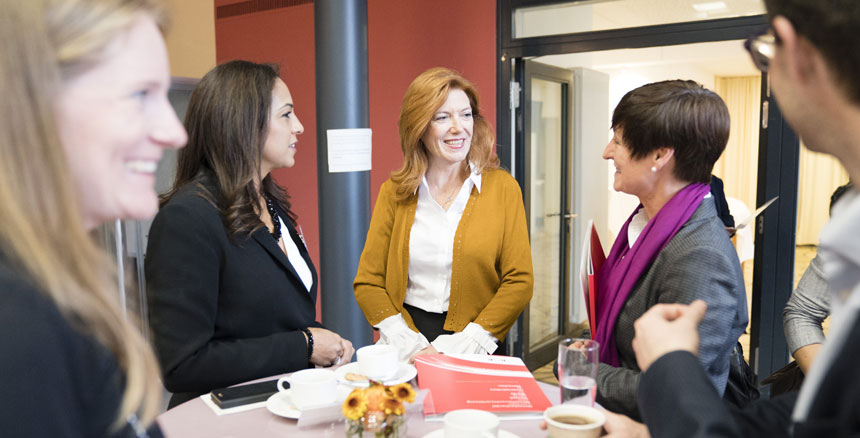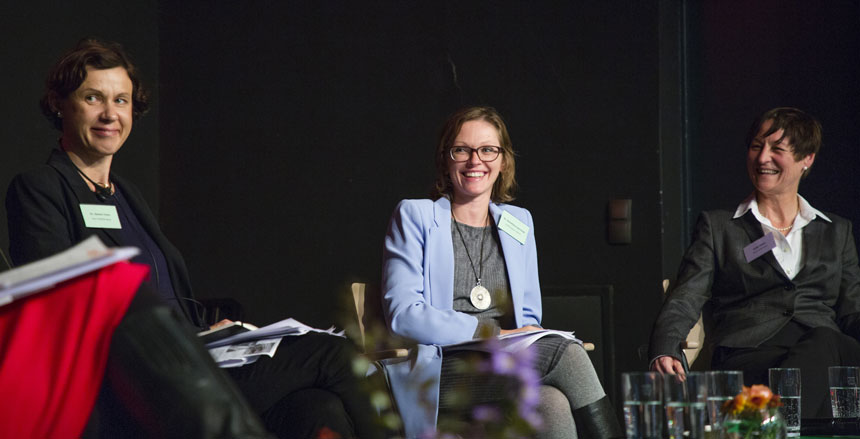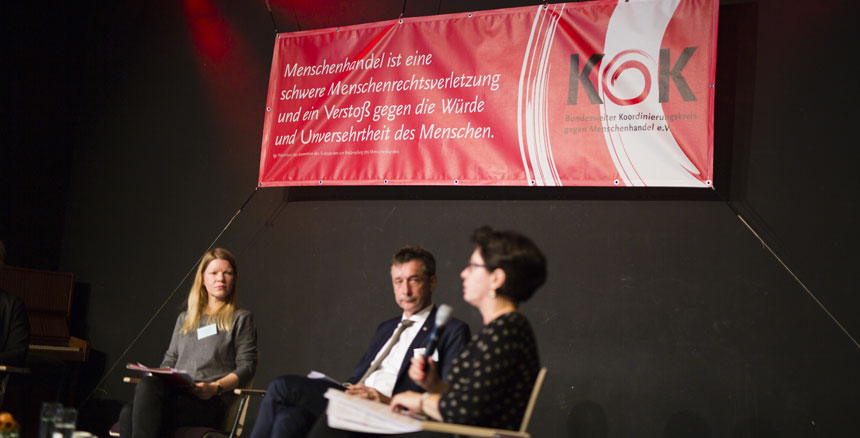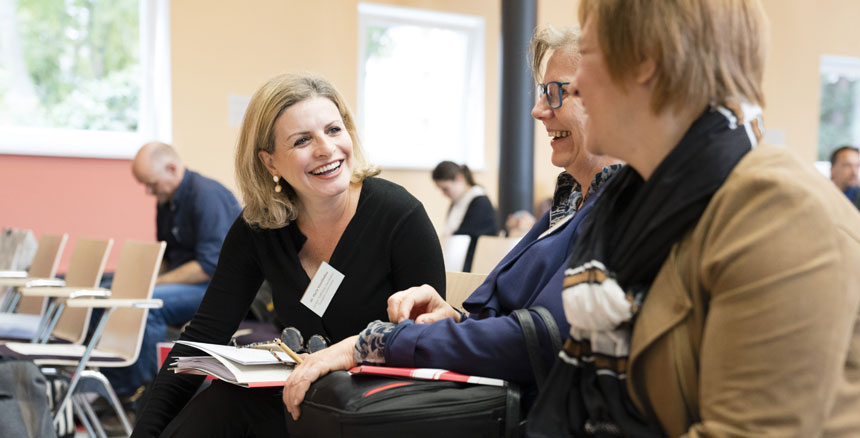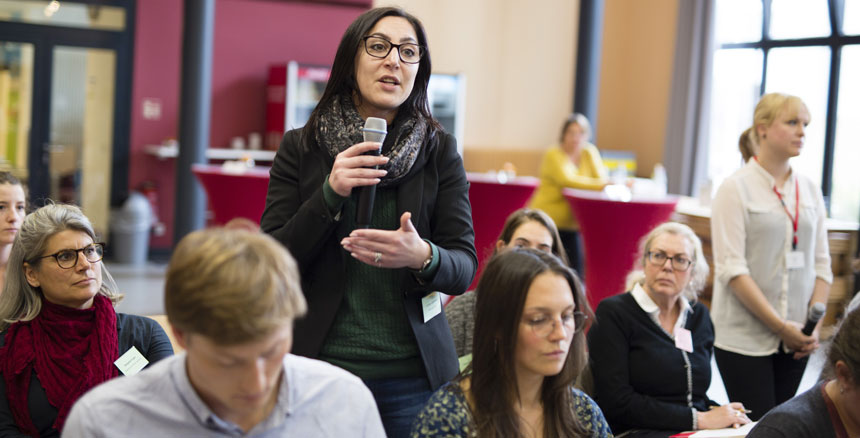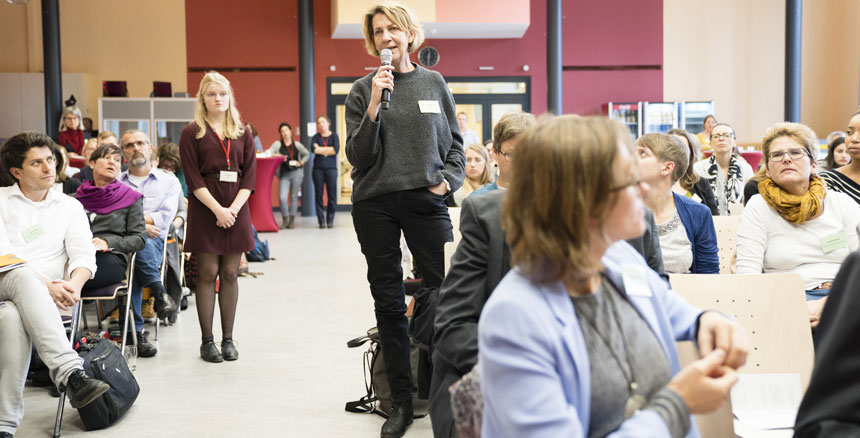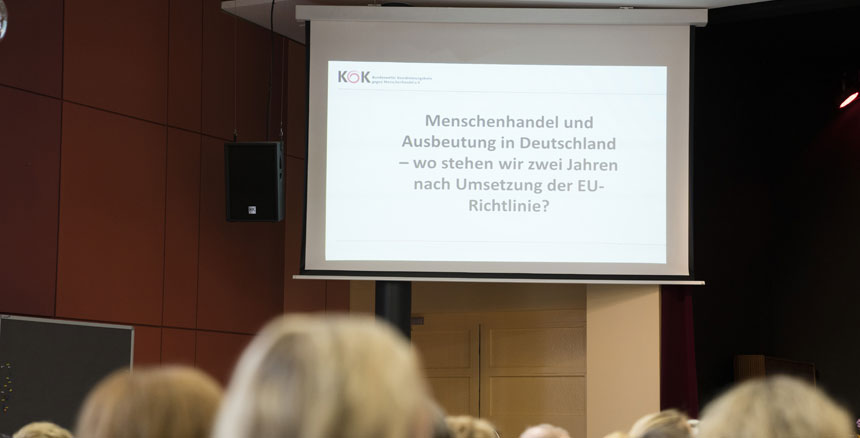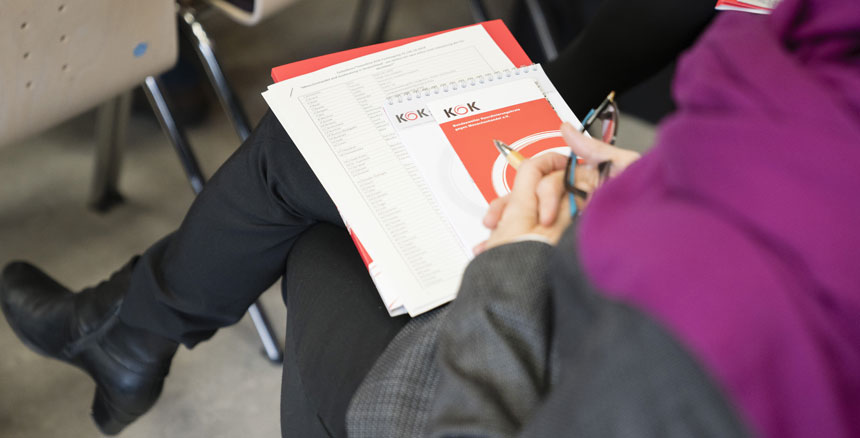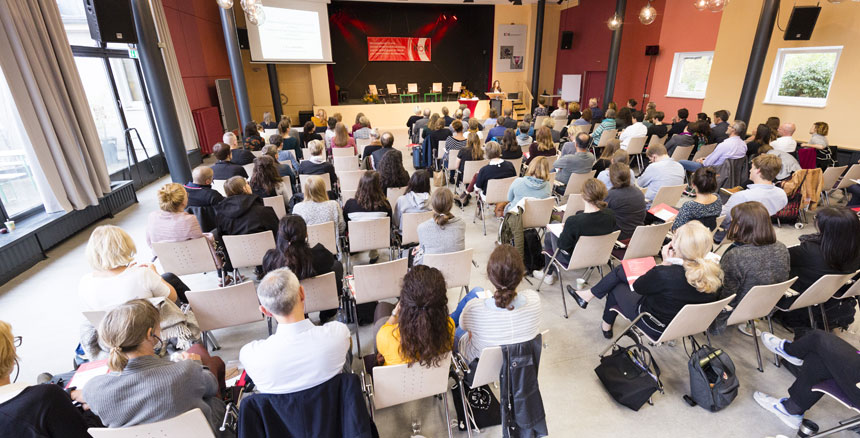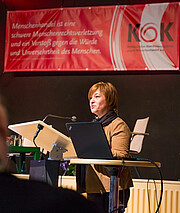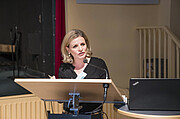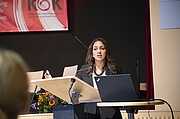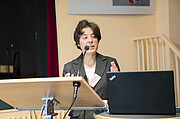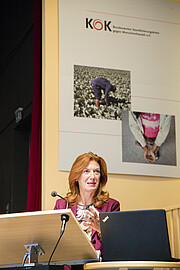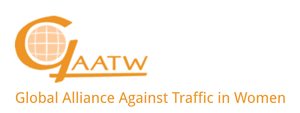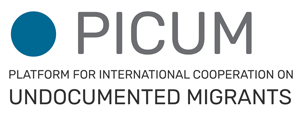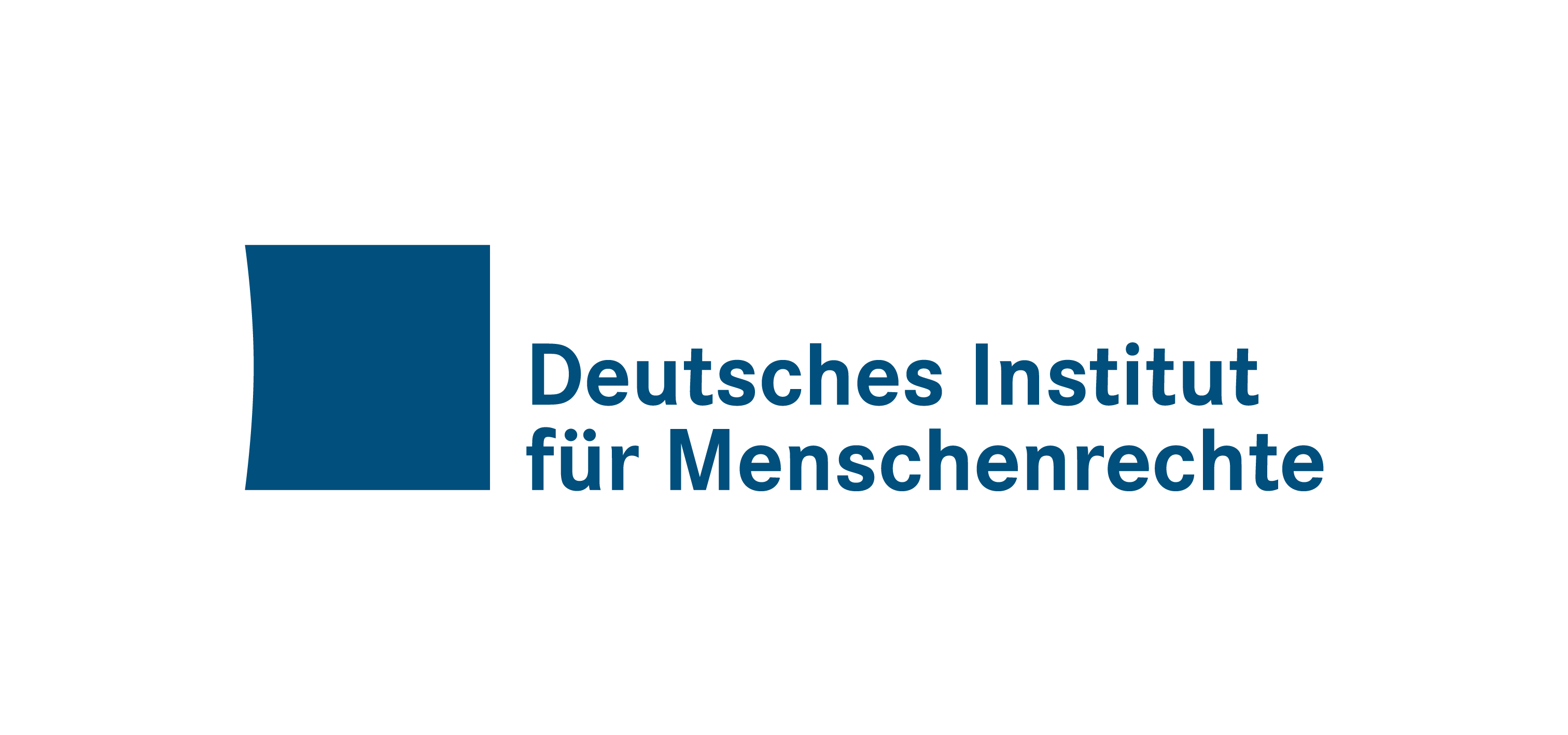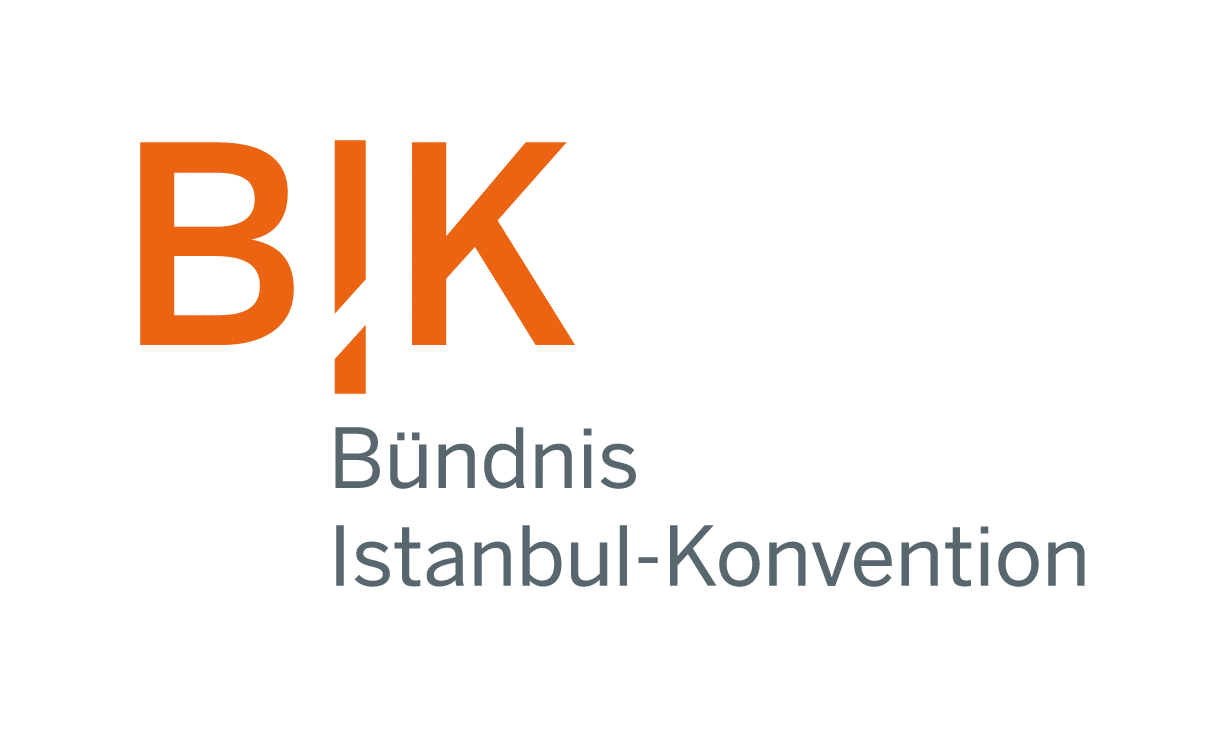- Home
- KOK
- News
- News
- KOK Events
- Conference Trafficking in Human Beings and Exploitation in Germany
- Symposium
- KOK publications
- Literature
- Trafficking in Human Beings
- Database of Case Law
- KOK Exhibition
- Projects & Themes
- Glossary
- Assistance
KOK Conference “Trafficking in Human Beings and Exploitation in Germany – Taking Stock Two Years after the Implementation of the EU Directive” 25–26 October 2018
On 25 and 26 October 2018, KOK organised its symposium on “Trafficking in Human Beings and Exploitation in Germany – Taking Stock Two Years after the Implementation of the EU Directive” in the Berliner Stadtmission Hall. National and international experts came together, two years after the implementation of Directive 2011/36/EU on combatting trafficking in human beings in Germany, to discuss what has been achieved since then and what potential for improvement remains. The new criminal statutory offences relating to trafficking in human beings for the purpose of forced criminal activities and begging, created as part of the EU directive implementation, were one of the main focal points. The symposium examined from various perspectives whether and how victims of these types of exploitation can be identified and given support. The guests at the situation in Austria, Great-Britain and Belgium to see what other European countries are doing to address this issue. This provided the impetus to enforce in Germany measures that have proved to be successful in those countries. The symposium also examined more closely the non-punishment clause, which aims to protect trafficked persons. The conference also included a European perspective on developments in Germany, thanks to the presence of Myria Vassiliadou, the EU Anti-Trafficking Coordinator, and Petya Nestorova, the Executive Secretary of the Council of Europe Convention on Action against Trafficking in Human Beings. The symposium opened with an address by the Parliamentary State Secretary of the Federal Ministry of Family, Senior Citizens, Women and Youth, Caren Marks.
The symposium was facilitated by Claudia Neusüß. Its full programme can be found here. You will find below short summaries as well as recordings of various talks and panels.
Welcome address by Caren Marks, Parliamentary State Secretary of the Federal Ministry of Family, Senior Citizens, Women and Youth
Caren Marks began her address by highlighting how topical and challenging the issue of trafficking in human beings is and the manifold expressions the phenomenon takes on through its various forms. She reminded the audience that combatting trafficking in human beings is one of the Federal Government’s aims, as enshrined in the Coalition Agreement. However, anti-trafficking efforts must be based on a human-rights and gender-specific approach, as trafficking in human beings, for the main part, relates to violence against women and girls. This issue is also to be addressed, as mentioned by the Coalition Agreement. Achieving these aims will require a new action plan to combat violence against women that should also include measures for trafficked persons.
Introductory keynote speech by Myria Vassiliadou, EU Anti-Trafficking Coordinator
Myria Vassiliadou began her speech by highlighting that the symposium organised by KOK is a rare and excellent example of how civil society can be involved in the implementation of EU provisions at a national level. Trafficking in human beings is an extremely lucrative crime. To better illustrate the considerable resulting profits, Ms Vassiliadou cited a Europol estimate according to which traffickers make €29 billion per year. She added that trafficking in human beings generates considerable profits not only for perpetrators, but also for the legal economy. Quoting a Europol report on trafficking in children, she also stressed how lucrative the exploitation of children is.
Introductory speech to Panel I by Parosha Chandran “Experiences from anti-trafficking proceedings, especially with regards to the application of the non-punishment clause”
Parosha Chandran began her introductory speech by briefly defining the non-punishment clause. Countries that have implemented EU Directive 2011/36 are required to protect trafficked persons from prosecution and penalty if the offences they committed occurred as a direct result of theim being trafficked. In 2008, in her first test case involving the non-punishment clause, a trafficked woman was given an eight-year prison sentence for using a false identity document. Ms Chandran managed to bring an appeal on the basis of Article 26 of the Council of Europe Convention on Action against Trafficking in Human Beings, although the Convention had only been signed by Great Britain at the time and had not yet come into force. This appeal enforced the non-punishment clause before British courts.
Panel I: "The implementation of EU Directive 2011/36/EU – Examples from Other European Countries"
Panel I, entitled “The implementation of EU Directive 2011/36/EU – Examples from Other European Countries” examined the situation in other EU member countries since their implementation of the Directive. The panellists essentially shared their experiences regarding trafficking in human beings for the purpose of forced begging, support services for trafficked males and minors, the enforcement of the non-punishment clause and cooperation amongst the various stakeholders. The following paragraphs summarise the panellists’ key statements.
Introductory speech to Panel II by Helga Gayer, "Experiences with the regard to the new statutory offences and to forced criminal activities and begging"
![[Translate to English:] ©Maurice Ressel, Helga Gayer, Federal Criminal Police Office ©Maurice Ressel, Helga Gayer, Federal Criminal Police Office](/fileadmin/_processed_/8/4/csm__c_Maurice-Ressel_-Helga-Gayer_-Bundeskriminalamt_a3846712ac.jpg)
Helga Gayer began by stating that it took a long time to implement the EU Directive in Germany to offer a more manageable provision in the field. A State evaluation of the new law is only to be carried out after four years, as enforcing laws in the field takes time. Ms Gayer nevertheless provided first insights into its application from the point of view of the police. According to the German Federal Criminal Police Office’s report on trafficking in human beings, there has been a decrease in the number of investigations, which does not mean that trafficking in human beings has subsided. It only indicates how many investigations were referred to the prosecution by police forces. This decrease could have various reasons, e.g. the increased terrorist risk that needs to be addressed by the police. The prostitution scene has also evolved, moving to more inaccessible areas. She added that trafficked persons have been increasingly reluctant to testify. Ms Gayer then presented data from the 2017 Report on Trafficking in Human Beings published by the German Federal Criminal Police Office and expanded on the two investigations into forced begging. Although there have been no proceedings in the field of trafficking in human beings for the purpose of forced criminal activities, the police have knowledge that crime rings are increasingly using minors suspected of having been trafficked.
Panel II "The German Criminal Code after the reform – experience to date from prosecuting authorities and support offered to trafficked persons"
Panel II, entitled “The German Criminal Code after the reform – experience to date from prosecuting authorities and support offered to trafficked persons” focused on the situation in Germany since the implementation of EU Directive 2011/36. The following paragraphs summarise the panellists’ key statements.
Keynote Speech by Patricia Le Cocq "Trafficking in human beings for exploitation in begging – the situation in Belgium"
Ms Le Cocq began by presenting the Federal Migration Centre Myria, which has been Belgium’s national rapporteur on trafficking in human beings since 2015 and is tasked, among other things, with promoting anti-trafficking efforts. Their main activities in this respect include preparing reports evaluating the implementation of legal provisions and starting criminal proceedings. Its 2016 report focused on trafficking in human beings for the purpose of forced begging.
Panel III "Current anti-trafficking considerations at the political level – politicians’ debate"
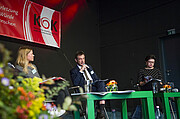
For Panel III, “Current anti-trafficking considerations at the political level – politicians’ debate”, politicians from parties Die Linke, Die Grünen/EFA and FDP were brought together to discuss the demands upon political decision-makers articulated during the conference. The following paragraphs summarise the panellists’ key statements.
Final address by Petya Nestorova "Developments in Germany from the Council of Europe’s point of view"
In her speech, Ms Nestorova primarily focused on the Council of Europe Convention on Action against Trafficking in Human Beings, that was initiated several years before the EU Directive and came into force in 2005. The Convention, which follows a multidisciplinary anti-trafficking approach and is based on four pillars–prevention, protection, prosecution and collaboration–is now applicable in 47 countries. In Germany, the Convention came into force in April 2013 and was evaluated by the GRETA expert commission in Germany for the first time in 2014. The second evaluation round is now underway. The ensuing report is scheduled for the end of May 2019. Ms Nestorova then moved on to various recommendations included in the first GRETA report and their implementation in Germany. A first recommendation articulated by GRETA was to adapt German criminal law to the international definition. This occurred through the Criminal Code reform in 2016. Moreover, Article 10 of the Council of Europe Convention provides that the identification of trafficked persons must occur in collaboration with various stakeholders, such as public authorities and NGOs.
Conclusion
The two extremely informative conference days with approximatively 150 participants, including guests from the judiciary, police forces, civil society and academia, not only offered an opportunity for an exchange of experiences, but also granted an insight into the various areas of work and institutions combatting trafficking in human beings and supporting trafficked persons in Germany two years after the implementation of EU Directive 2011/36/EU. The police presented various measures implementing the EU Directive, for example, especially in connection with the new statutory offences. However, it emerged that general accommodation options, support services for trafficked men and minors as well as the funding of support services are still largely inadequate. Thanks to the participation of international experts from Belgium, Great Britain and Austria, the symposium gained an international perspective and best-practice examples relating to accommodation for men and minors, the non-punishment clause and the new statutory offence of forced begging. In her concluding remarks, KOK board member Andrea Hitzke highlighted that Germany can learn from these positive examples. KOK will continue to evaluate the situation and present practical examples to political decision-makers. As became clear from the contributions of the two European Union representatives, Myria Vassiliadou, the EU Anti-Trafficking Coordinator, and Petya Nestorova, Executive Secretary of the Council of Europe Convention on Action against Trafficking in Human Beings, the EU will continue to accompany the developments in Germany. Sophia Wirsching, KOK’s Executive Director, ended the conference by stressing that trafficked persons hold rights, which must constantly be claimed at various levels. This is, after all, one of the tasks of many of the stakeholders present at the symposium.

